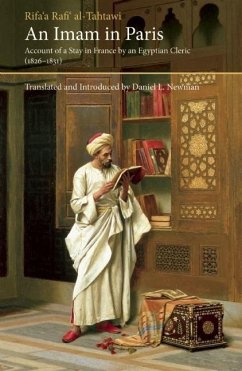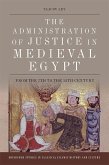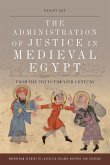- Broschiertes Buch
- Merkliste
- Auf die Merkliste
- Bewerten Bewerten
- Teilen
- Produkt teilen
- Produkterinnerung
- Produkterinnerung
An Imam in Paris (Takhlis al-Ibriz fi Talkhis Bariz), is one of the earliest records of the Muslim encounter with Enlightenment-era European ideas. Al-Tahtawi's book helped introduce ideas of modernity to his native land.
Andere Kunden interessierten sich auch für
![Imam 'Ali From Concise History to Timeless Mystery Imam 'Ali From Concise History to Timeless Mystery]() Reza Shah-KazemiImam 'Ali From Concise History to Timeless Mystery14,99 €
Reza Shah-KazemiImam 'Ali From Concise History to Timeless Mystery14,99 €![The Fatimid Empire The Fatimid Empire]() Michael BrettThe Fatimid Empire36,99 €
Michael BrettThe Fatimid Empire36,99 €![The Administration of Justice in Medieval Egypt The Administration of Justice in Medieval Egypt]() Yaacov LevThe Administration of Justice in Medieval Egypt26,99 €
Yaacov LevThe Administration of Justice in Medieval Egypt26,99 €![Rediscovering the Islamic Classics Rediscovering the Islamic Classics]() Ahmed El ShamsyRediscovering the Islamic Classics33,99 €
Ahmed El ShamsyRediscovering the Islamic Classics33,99 €![The Administration of Justice in Medieval Egypt The Administration of Justice in Medieval Egypt]() Yaacov Lev (Bar Ilan University)The Administration of Justice in Medieval Egypt149,99 €
Yaacov Lev (Bar Ilan University)The Administration of Justice in Medieval Egypt149,99 €![Conspiracy in Modern Egyptian Literature Conspiracy in Modern Egyptian Literature]() Benjamin KoerberConspiracy in Modern Egyptian Literature37,99 €
Benjamin KoerberConspiracy in Modern Egyptian Literature37,99 €![Making the Arab World Making the Arab World]() Fawaz A. GergesMaking the Arab World23,99 €
Fawaz A. GergesMaking the Arab World23,99 €-
-
-
An Imam in Paris (Takhlis al-Ibriz fi Talkhis Bariz), is one of the earliest records of the Muslim encounter with Enlightenment-era European ideas. Al-Tahtawi's book helped introduce ideas of modernity to his native land.
Hinweis: Dieser Artikel kann nur an eine deutsche Lieferadresse ausgeliefert werden.
Hinweis: Dieser Artikel kann nur an eine deutsche Lieferadresse ausgeliefert werden.
Produktdetails
- Produktdetails
- Saqi Essentials
- Verlag: Saqi Books
- Seitenzahl: 405
- Erscheinungstermin: 13. Dezember 2011
- Englisch
- Abmessung: 233mm x 151mm x 35mm
- Gewicht: 550g
- ISBN-13: 9780863564079
- ISBN-10: 0863564070
- Artikelnr.: 32207807
- Herstellerkennzeichnung
- Libri GmbH
- Europaallee 1
- 36244 Bad Hersfeld
- gpsr@libri.de
- Saqi Essentials
- Verlag: Saqi Books
- Seitenzahl: 405
- Erscheinungstermin: 13. Dezember 2011
- Englisch
- Abmessung: 233mm x 151mm x 35mm
- Gewicht: 550g
- ISBN-13: 9780863564079
- ISBN-10: 0863564070
- Artikelnr.: 32207807
- Herstellerkennzeichnung
- Libri GmbH
- Europaallee 1
- 36244 Bad Hersfeld
- gpsr@libri.de
Daniel L. Newman is Professor of Arabic and Course Director of the MA in Arabic-English Translation and Interpreting at the University of Durham. His other works include Modern Arabic Short Stories: A Bilingual Reader (with Ronak Husni, Saqi Books, 2008).
Contents
Note on Transcription 9
Preface to the Second Edition 11
Preface13
Part One: Introduction
1. The 'Egyptian' Mission to Europe17
Background17
The Students29
2. Life of al-Tahtawi1
Auspicious Beginnings31
The First Exile33
Hasan al-Attar: An Early Reformist Alim 36
Return of the Prodigal Son 40
Teacher, Trainer, Translator, Editor (1835-49) 47
The Second Exile (1850-54) 53
Ali Mubarak: 'The Father of Education' (Abu'l-Ta'lim) 56
al-Tahtawi the Reformer (1854-73) 68
3. al-Tahtawi in Europe72
4. The Book87
Genesis and Themes87
Format and Style94
part two: Takhlis al-Ibriz fi Talkhis Bariz
Preface101
Introduction107
First Chapter. Regarding what seemed to me to be the reason behind
our departure for this Land of Infidelity and Obstinacy, which
lies far away from us and where there are great expenses because
of the high cost of living107
Second Chapter. Regarding the required sciences and desirable skills
and crafts117
Third Chapter. On the position of the Lands of the Franks in
comparison with other countries, on the advantage the French
nation has over all other Franks, and the reason why His
Excellency decided to send us there and not to any of the other
Frank kingdoms119
Fourth Chapter. On the leaders of this mission132
Core of the Book135
First Essay136
First Section. From the departure from Cairo to the arrival at
the port of Alexandria136
Second Section. Treatise on this city, which is an abridgement of
several Arabic and French books, from which we have retained
that which appeared to be accurate136
Third Section. On the voyage on the sea on which the port of
Alexandria lies141
Fourth Section. On the mountains, countries and islands we saw144
Second Essay150
First Section. On our stay in the city of Marseilles150
Second Section. From our departure from Marseilles to the arrival
in Paris and on the itinerary between the two cities162
Third Essay163
First Section. On the topography of Paris; its geographical location,
soil, climate and surrounding area163
Second Section. On the people of Paris176
Third Section. On the organization of the French state192
Fourth Section. On the housing of the people of Paris and related
matters216
Fifth Section. On the food of the people of Paris and their eating
and drinking habits222
Sixth Section. On the clothing of the French225
Seventh Section. On the entertainments of Paris228
Eighth Section. On hygiene in the city of Paris236
Ninth Section. On the interest in medical sciences in Paris237
Tenth Section. On charity in the city of Paris240
Eleventh Section. On earnings in the city of Paris and the
entrepreneurial skills there245
Twelfth Section. On the religion of the people of Paris251
Thirteenth Section. On progress by the people of Paris in the sciences,
arts and crafts, the way these are organized, as well as an
explanation of related matters254
Fourth Essay276
Introduction276
First Section. On the organization of instruction in reading and
writing, etc., which we received at the beginning277
Second Section. On the supervision of our comings and goings279
Third Section. On how our ruler exhorted us to work and show
diligence282
Fourth Section. On some of the letters between myself and some of
the leading French scholars, other than Monsieur Jomard284
Fifth Section. On the books I read in the city of Paris; the nature of
the exams; what Monsieur Jomard wrote to me; reports of the
final exam in scholarly journals291
Sixth Section. On the exams I took in the city of Paris, especially the
final exam before my return to Egypt300
Fifth Essay305
First Section. Being an introduction in order to understand the
reason why the French no longer obeyed their king306
Second Section. On the changes that were introduced and on
the revolution that ensued from them310
Third Section. On the actions of the king in this period and
what happened after he agreed to a conciliation when it was too
late, and his abdication in favour of his son317
Fourth Section. On the decision made by the Chamber of Deputies
and how as a result of this revolution the Duke of Orléans was
appointed king of the French320
Fifth Section. On what happened to the Ministers who signed the
royal ordinances that caused the end of the reign of the first king,
and who committed this act without thinking of the consequences
and desired that which cannot be attained. As the poet says:
'People, though their natures may differ, covet from the world
that which they have not obtained'325
Sixth Section. On how after the revolution Charles X was scorned
by the French and how it did not stop there329
Seventh Section. On the reaction by Frank states upon hearing of
the ousting of the first king and the assignment of the kingdom
to the second and on their acceptance of this332
Sixth Essay334
First Section. On the division of the sciences and arts according
to the Franks334
Second Section. On the classification of the languages as such, and
the use of the French language335
Third Section. On the art of writing339
Fourth Section. On the science of rhetoric, which includes eloquence,
the hidden meanings of words and stylistic embellishments342
Fifth Section. On logic344
Sixth Section. On the ten categories that are attributed to Aristotle348
Seventh Section. On the science of arithmetic, which is called
arithmétique in the language of the Franks351
Epilogue
On Our Return from Paris to Egypt and a Number of Other Matters 358
Bibliography 379
Index 407
Note on Transcription 9
Preface to the Second Edition 11
Preface13
Part One: Introduction
1. The 'Egyptian' Mission to Europe17
Background17
The Students29
2. Life of al-Tahtawi1
Auspicious Beginnings31
The First Exile33
Hasan al-Attar: An Early Reformist Alim 36
Return of the Prodigal Son 40
Teacher, Trainer, Translator, Editor (1835-49) 47
The Second Exile (1850-54) 53
Ali Mubarak: 'The Father of Education' (Abu'l-Ta'lim) 56
al-Tahtawi the Reformer (1854-73) 68
3. al-Tahtawi in Europe72
4. The Book87
Genesis and Themes87
Format and Style94
part two: Takhlis al-Ibriz fi Talkhis Bariz
Preface101
Introduction107
First Chapter. Regarding what seemed to me to be the reason behind
our departure for this Land of Infidelity and Obstinacy, which
lies far away from us and where there are great expenses because
of the high cost of living107
Second Chapter. Regarding the required sciences and desirable skills
and crafts117
Third Chapter. On the position of the Lands of the Franks in
comparison with other countries, on the advantage the French
nation has over all other Franks, and the reason why His
Excellency decided to send us there and not to any of the other
Frank kingdoms119
Fourth Chapter. On the leaders of this mission132
Core of the Book135
First Essay136
First Section. From the departure from Cairo to the arrival at
the port of Alexandria136
Second Section. Treatise on this city, which is an abridgement of
several Arabic and French books, from which we have retained
that which appeared to be accurate136
Third Section. On the voyage on the sea on which the port of
Alexandria lies141
Fourth Section. On the mountains, countries and islands we saw144
Second Essay150
First Section. On our stay in the city of Marseilles150
Second Section. From our departure from Marseilles to the arrival
in Paris and on the itinerary between the two cities162
Third Essay163
First Section. On the topography of Paris; its geographical location,
soil, climate and surrounding area163
Second Section. On the people of Paris176
Third Section. On the organization of the French state192
Fourth Section. On the housing of the people of Paris and related
matters216
Fifth Section. On the food of the people of Paris and their eating
and drinking habits222
Sixth Section. On the clothing of the French225
Seventh Section. On the entertainments of Paris228
Eighth Section. On hygiene in the city of Paris236
Ninth Section. On the interest in medical sciences in Paris237
Tenth Section. On charity in the city of Paris240
Eleventh Section. On earnings in the city of Paris and the
entrepreneurial skills there245
Twelfth Section. On the religion of the people of Paris251
Thirteenth Section. On progress by the people of Paris in the sciences,
arts and crafts, the way these are organized, as well as an
explanation of related matters254
Fourth Essay276
Introduction276
First Section. On the organization of instruction in reading and
writing, etc., which we received at the beginning277
Second Section. On the supervision of our comings and goings279
Third Section. On how our ruler exhorted us to work and show
diligence282
Fourth Section. On some of the letters between myself and some of
the leading French scholars, other than Monsieur Jomard284
Fifth Section. On the books I read in the city of Paris; the nature of
the exams; what Monsieur Jomard wrote to me; reports of the
final exam in scholarly journals291
Sixth Section. On the exams I took in the city of Paris, especially the
final exam before my return to Egypt300
Fifth Essay305
First Section. Being an introduction in order to understand the
reason why the French no longer obeyed their king306
Second Section. On the changes that were introduced and on
the revolution that ensued from them310
Third Section. On the actions of the king in this period and
what happened after he agreed to a conciliation when it was too
late, and his abdication in favour of his son317
Fourth Section. On the decision made by the Chamber of Deputies
and how as a result of this revolution the Duke of Orléans was
appointed king of the French320
Fifth Section. On what happened to the Ministers who signed the
royal ordinances that caused the end of the reign of the first king,
and who committed this act without thinking of the consequences
and desired that which cannot be attained. As the poet says:
'People, though their natures may differ, covet from the world
that which they have not obtained'325
Sixth Section. On how after the revolution Charles X was scorned
by the French and how it did not stop there329
Seventh Section. On the reaction by Frank states upon hearing of
the ousting of the first king and the assignment of the kingdom
to the second and on their acceptance of this332
Sixth Essay334
First Section. On the division of the sciences and arts according
to the Franks334
Second Section. On the classification of the languages as such, and
the use of the French language335
Third Section. On the art of writing339
Fourth Section. On the science of rhetoric, which includes eloquence,
the hidden meanings of words and stylistic embellishments342
Fifth Section. On logic344
Sixth Section. On the ten categories that are attributed to Aristotle348
Seventh Section. On the science of arithmetic, which is called
arithmétique in the language of the Franks351
Epilogue
On Our Return from Paris to Egypt and a Number of Other Matters 358
Bibliography 379
Index 407
Contents
Note on Transcription 9
Preface to the Second Edition 11
Preface13
Part One: Introduction
1. The 'Egyptian' Mission to Europe17
Background17
The Students29
2. Life of al-Tahtawi1
Auspicious Beginnings31
The First Exile33
Hasan al-Attar: An Early Reformist Alim 36
Return of the Prodigal Son 40
Teacher, Trainer, Translator, Editor (1835-49) 47
The Second Exile (1850-54) 53
Ali Mubarak: 'The Father of Education' (Abu'l-Ta'lim) 56
al-Tahtawi the Reformer (1854-73) 68
3. al-Tahtawi in Europe72
4. The Book87
Genesis and Themes87
Format and Style94
part two: Takhlis al-Ibriz fi Talkhis Bariz
Preface101
Introduction107
First Chapter. Regarding what seemed to me to be the reason behind
our departure for this Land of Infidelity and Obstinacy, which
lies far away from us and where there are great expenses because
of the high cost of living107
Second Chapter. Regarding the required sciences and desirable skills
and crafts117
Third Chapter. On the position of the Lands of the Franks in
comparison with other countries, on the advantage the French
nation has over all other Franks, and the reason why His
Excellency decided to send us there and not to any of the other
Frank kingdoms119
Fourth Chapter. On the leaders of this mission132
Core of the Book135
First Essay136
First Section. From the departure from Cairo to the arrival at
the port of Alexandria136
Second Section. Treatise on this city, which is an abridgement of
several Arabic and French books, from which we have retained
that which appeared to be accurate136
Third Section. On the voyage on the sea on which the port of
Alexandria lies141
Fourth Section. On the mountains, countries and islands we saw144
Second Essay150
First Section. On our stay in the city of Marseilles150
Second Section. From our departure from Marseilles to the arrival
in Paris and on the itinerary between the two cities162
Third Essay163
First Section. On the topography of Paris; its geographical location,
soil, climate and surrounding area163
Second Section. On the people of Paris176
Third Section. On the organization of the French state192
Fourth Section. On the housing of the people of Paris and related
matters216
Fifth Section. On the food of the people of Paris and their eating
and drinking habits222
Sixth Section. On the clothing of the French225
Seventh Section. On the entertainments of Paris228
Eighth Section. On hygiene in the city of Paris236
Ninth Section. On the interest in medical sciences in Paris237
Tenth Section. On charity in the city of Paris240
Eleventh Section. On earnings in the city of Paris and the
entrepreneurial skills there245
Twelfth Section. On the religion of the people of Paris251
Thirteenth Section. On progress by the people of Paris in the sciences,
arts and crafts, the way these are organized, as well as an
explanation of related matters254
Fourth Essay276
Introduction276
First Section. On the organization of instruction in reading and
writing, etc., which we received at the beginning277
Second Section. On the supervision of our comings and goings279
Third Section. On how our ruler exhorted us to work and show
diligence282
Fourth Section. On some of the letters between myself and some of
the leading French scholars, other than Monsieur Jomard284
Fifth Section. On the books I read in the city of Paris; the nature of
the exams; what Monsieur Jomard wrote to me; reports of the
final exam in scholarly journals291
Sixth Section. On the exams I took in the city of Paris, especially the
final exam before my return to Egypt300
Fifth Essay305
First Section. Being an introduction in order to understand the
reason why the French no longer obeyed their king306
Second Section. On the changes that were introduced and on
the revolution that ensued from them310
Third Section. On the actions of the king in this period and
what happened after he agreed to a conciliation when it was too
late, and his abdication in favour of his son317
Fourth Section. On the decision made by the Chamber of Deputies
and how as a result of this revolution the Duke of Orléans was
appointed king of the French320
Fifth Section. On what happened to the Ministers who signed the
royal ordinances that caused the end of the reign of the first king,
and who committed this act without thinking of the consequences
and desired that which cannot be attained. As the poet says:
'People, though their natures may differ, covet from the world
that which they have not obtained'325
Sixth Section. On how after the revolution Charles X was scorned
by the French and how it did not stop there329
Seventh Section. On the reaction by Frank states upon hearing of
the ousting of the first king and the assignment of the kingdom
to the second and on their acceptance of this332
Sixth Essay334
First Section. On the division of the sciences and arts according
to the Franks334
Second Section. On the classification of the languages as such, and
the use of the French language335
Third Section. On the art of writing339
Fourth Section. On the science of rhetoric, which includes eloquence,
the hidden meanings of words and stylistic embellishments342
Fifth Section. On logic344
Sixth Section. On the ten categories that are attributed to Aristotle348
Seventh Section. On the science of arithmetic, which is called
arithmétique in the language of the Franks351
Epilogue
On Our Return from Paris to Egypt and a Number of Other Matters 358
Bibliography 379
Index 407
Note on Transcription 9
Preface to the Second Edition 11
Preface13
Part One: Introduction
1. The 'Egyptian' Mission to Europe17
Background17
The Students29
2. Life of al-Tahtawi1
Auspicious Beginnings31
The First Exile33
Hasan al-Attar: An Early Reformist Alim 36
Return of the Prodigal Son 40
Teacher, Trainer, Translator, Editor (1835-49) 47
The Second Exile (1850-54) 53
Ali Mubarak: 'The Father of Education' (Abu'l-Ta'lim) 56
al-Tahtawi the Reformer (1854-73) 68
3. al-Tahtawi in Europe72
4. The Book87
Genesis and Themes87
Format and Style94
part two: Takhlis al-Ibriz fi Talkhis Bariz
Preface101
Introduction107
First Chapter. Regarding what seemed to me to be the reason behind
our departure for this Land of Infidelity and Obstinacy, which
lies far away from us and where there are great expenses because
of the high cost of living107
Second Chapter. Regarding the required sciences and desirable skills
and crafts117
Third Chapter. On the position of the Lands of the Franks in
comparison with other countries, on the advantage the French
nation has over all other Franks, and the reason why His
Excellency decided to send us there and not to any of the other
Frank kingdoms119
Fourth Chapter. On the leaders of this mission132
Core of the Book135
First Essay136
First Section. From the departure from Cairo to the arrival at
the port of Alexandria136
Second Section. Treatise on this city, which is an abridgement of
several Arabic and French books, from which we have retained
that which appeared to be accurate136
Third Section. On the voyage on the sea on which the port of
Alexandria lies141
Fourth Section. On the mountains, countries and islands we saw144
Second Essay150
First Section. On our stay in the city of Marseilles150
Second Section. From our departure from Marseilles to the arrival
in Paris and on the itinerary between the two cities162
Third Essay163
First Section. On the topography of Paris; its geographical location,
soil, climate and surrounding area163
Second Section. On the people of Paris176
Third Section. On the organization of the French state192
Fourth Section. On the housing of the people of Paris and related
matters216
Fifth Section. On the food of the people of Paris and their eating
and drinking habits222
Sixth Section. On the clothing of the French225
Seventh Section. On the entertainments of Paris228
Eighth Section. On hygiene in the city of Paris236
Ninth Section. On the interest in medical sciences in Paris237
Tenth Section. On charity in the city of Paris240
Eleventh Section. On earnings in the city of Paris and the
entrepreneurial skills there245
Twelfth Section. On the religion of the people of Paris251
Thirteenth Section. On progress by the people of Paris in the sciences,
arts and crafts, the way these are organized, as well as an
explanation of related matters254
Fourth Essay276
Introduction276
First Section. On the organization of instruction in reading and
writing, etc., which we received at the beginning277
Second Section. On the supervision of our comings and goings279
Third Section. On how our ruler exhorted us to work and show
diligence282
Fourth Section. On some of the letters between myself and some of
the leading French scholars, other than Monsieur Jomard284
Fifth Section. On the books I read in the city of Paris; the nature of
the exams; what Monsieur Jomard wrote to me; reports of the
final exam in scholarly journals291
Sixth Section. On the exams I took in the city of Paris, especially the
final exam before my return to Egypt300
Fifth Essay305
First Section. Being an introduction in order to understand the
reason why the French no longer obeyed their king306
Second Section. On the changes that were introduced and on
the revolution that ensued from them310
Third Section. On the actions of the king in this period and
what happened after he agreed to a conciliation when it was too
late, and his abdication in favour of his son317
Fourth Section. On the decision made by the Chamber of Deputies
and how as a result of this revolution the Duke of Orléans was
appointed king of the French320
Fifth Section. On what happened to the Ministers who signed the
royal ordinances that caused the end of the reign of the first king,
and who committed this act without thinking of the consequences
and desired that which cannot be attained. As the poet says:
'People, though their natures may differ, covet from the world
that which they have not obtained'325
Sixth Section. On how after the revolution Charles X was scorned
by the French and how it did not stop there329
Seventh Section. On the reaction by Frank states upon hearing of
the ousting of the first king and the assignment of the kingdom
to the second and on their acceptance of this332
Sixth Essay334
First Section. On the division of the sciences and arts according
to the Franks334
Second Section. On the classification of the languages as such, and
the use of the French language335
Third Section. On the art of writing339
Fourth Section. On the science of rhetoric, which includes eloquence,
the hidden meanings of words and stylistic embellishments342
Fifth Section. On logic344
Sixth Section. On the ten categories that are attributed to Aristotle348
Seventh Section. On the science of arithmetic, which is called
arithmétique in the language of the Franks351
Epilogue
On Our Return from Paris to Egypt and a Number of Other Matters 358
Bibliography 379
Index 407








